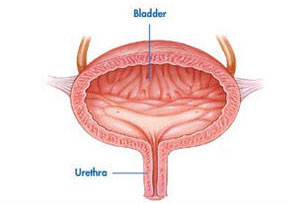Bladder
 The bladder is a hollow organ which lies in the pelvis and is responsible for storing urine. Urine is produced by the kidneys at a constant rate, flows down tubes called the ureters and is stored by the bladder. It is then passed through the urethra during urination. The bladder muscle contracts during urination.
The bladder is a hollow organ which lies in the pelvis and is responsible for storing urine. Urine is produced by the kidneys at a constant rate, flows down tubes called the ureters and is stored by the bladder. It is then passed through the urethra during urination. The bladder muscle contracts during urination.
The bladder is made up of three layers. A thin surface layer called the urothelium lines the inside of the bladder. Next is a layer called the lamina propria. Outside the lamina propria is the bladder muscle, which is itself covered by fat.
What symptoms do patients with bladder problems get?
Patients may have troublesome symptoms from their bladder including the need to urinate often (frequency), to get up at night to urinate (nocturia), to run to pass urine (urgency), and leaking before they manage to get to a toilet (urge incontinence). These are some of the signs of bladder disease, which require investigation, and for which treatments are available.
The passing of blood in the urine (haematuria) is a very worrying symptom, and can be the cause of serious bladder disease, including bladder cancer. Patients must seek an urgent appointment from their GP for further assessment and onward referral if necessary. However, haematuria can also be due to a urinary infection, bleeding from the prostate gland, or the presence of kidney or bladder stones among other causes. It is important, however, that if you have seen blood in the urine, you let your GP know as soon as possible.
Watch this video in which Professor John Kelly talks about haematuria, or blood in the urine
